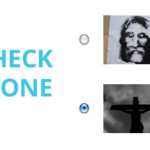We run our website the way we wished the whole internet worked: we provide high quality original content with no ads. We are funded solely by your direct support. Please consider supporting this project.

Does God Inflict Physical Disabilities?
In Exodus 4, we find Moses claiming that he could not be used by Yahweh to get the children of Israel out of Egypt because he was “slow of speech and tongue.” To this Yahweh replies, “Who gave human beings their mouths? Who makes them deaf or mute? Who gives them sight or makes them blind? Is it not I, the LORD” (Ex 4:10-1)?
However, this is not what we find in the teachings and life of God’s ultimate revelation in Christ. Without exception, when Jesus confronted the crippled, deaf, blind, mute, diseased, or demon-possessed, he uniformed diagnosed their affliction as something that God did not will. Often Jesus or the Gospel authors specify that it was evil forces (Satan or demons), not God, that were causing the afflictions (see Mk 9:25, Lk 11:14; 13:11-16, Acts 10:38).
How then should we assess this passage in light of the uniform view of Jesus, the NT and early post-apostolic church that all such infirmities are directly or indirectly brought about by Satan and his minions and are against God’s will?
To begin, it is exegetically significant that the passage from Exodus 4 does not suggest that Yahweh determines which individuals will be deaf, mute or blind, “as if God entered into the womb of every pregnant woman and determined whether and how a child would have disabilities,” to quote Terrence Fretheim.[1] The afflictions mentioned in this passage are spoken of in general terms and simply reflect that Yahweh is the Creator and Lord over a creation that unfortunately includes such things as deafness, muteness and blindness. This is closely related to the ANE concept of a kingdom as a king-centered corporate whole, which also could be plausibly appealed to as a means of accounting for this passage. And one could argue that the need for God to over-emphasize the importance of creational-monotheism to his people at this early stage in the progress of revelation and/or perhaps even the metonymy of the subject could also be appealed to along these lines.
Yet, we see how this passage bears witness to the cross, as I argue in my recently-released Cross Vision, only when we interpret it through the lens of Calvary. As he did on Calvary, I submit that Yahweh is here communicating to Moses in a way that reflects his willingness to assume responsibility for all the afflictions that unfortunately take place in his demonically-oppressed creation, despite the fact that every one of these afflictions are contrary to his will, as Jesus’ ministry makes clear. And Yahweh in this particular instance is speaking this way in order to reassure Moses that his speech-impairment is hardly an insurmountable problem for him—though, much to the chagrin of Yahweh—Moses continued to refuse this assurance, resulting in Yahweh accommodating Moses’ stubbornness by letting Aaron serve as his spokesperson (Ex 4:13-6).
Join us next week at the Cross Vision Conference to explore questions like these further.
[1] T. Fretheim, Exodus (Louisville, KY: John Knox Press, 1992), 72.
Photo credit: ILO in Asia and the Pacific via Visualhunt / CC BY-NC-ND
Category: General
Tags: Cruciform Theology, Sickness, Spiritual Warfare
Topics: Interpreting Violent Pictures and Troubling Behaviors
Related Reading

Crucified Transcendence
If our thinking about God is to be faithful to the New Testament, then all of our thinking about God must, from beginning to end, be centered on Christ. I’m persuaded that even our thinking about God in his transcendent, eternal state should begin and proceed with the Pauline conviction that we know nothing “except…

Sermons: The Church – Week Five
In week five of this sermon series, Greg Boyd discusses what the church should look like in the lens of the cross. A universal Church was born out of the ministry of Jesus, and this Church is empowered to look like the Cross. In this sermon, Greg shows us why it’s so important, as the…

The Reality of Satan and the Spiritual Realm
A theme that underlies Jesus’ entire ministry is the apocalyptic assumption that creation has been seized by a cosmic force and that God is now battling this force to rescue it. Jesus understood himself to be the one in whom this battle was to be played out in a decisive way. The assumption is evident…

Christ-Centered or Cross-Centered?
The Christocentric Movement Thanks largely to the work of Karl Barth, we have over the last half-century witnessed an increasing number of theologians advocating some form of a Christ-centered (or, to use a fancier theological term, a “Christocentric”) theology. Never has this Christocentric clamor a been louder than right now. There are a plethora of…

It’s All About the Crucified Christ
The world was created by Christ and for Christ (Col 1:16). At the center of God’s purpose for creation is his plan to unite himself to us in Christ, reveal himself to us through Christ, and share his life with us by incorporating us into Christ. We don’t know what this might have looked like…

How the Bible is Trustworthy
All of God’s communication in the Scriptures are covenantal in nature. Expressing his covenantal love and faithfulness, God stoops to “breath” Scripture as a means of bearing witness to his covenant relationship with Israel, and then with the Church. Ultimately God “breathed” (2 Tim 3:16) the Scriptures in order to bear witness to the One…
